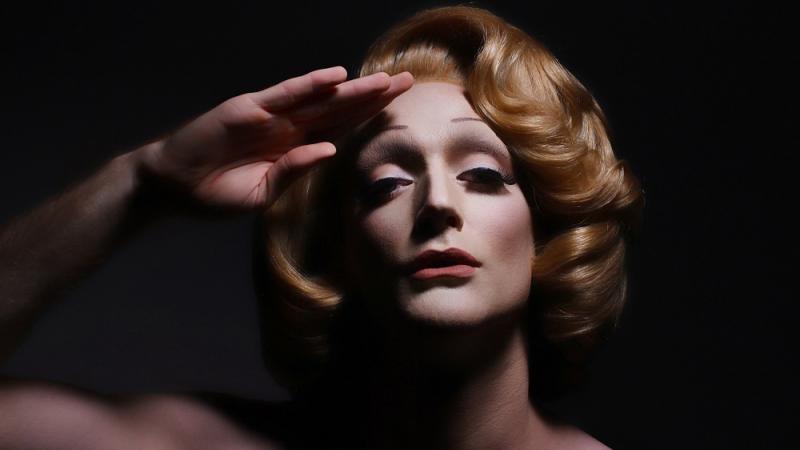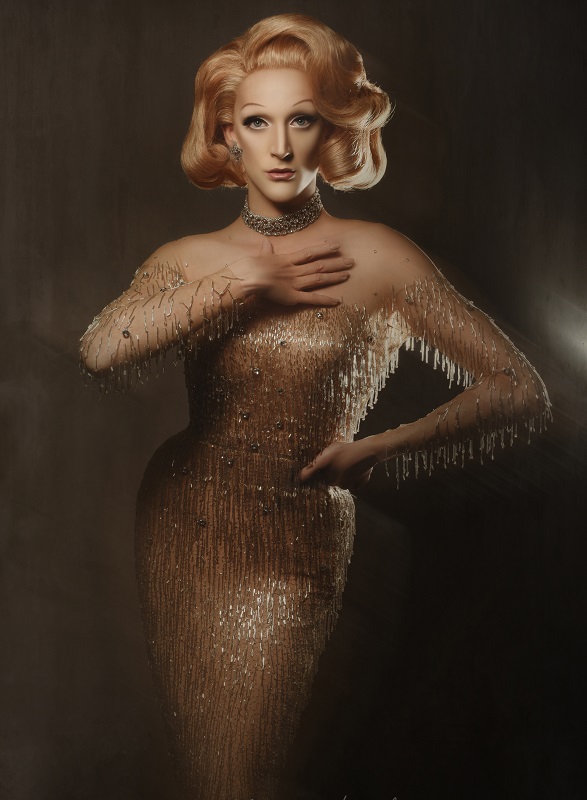Dietrich: Natural Duty, Wilton's Music Hall review - elegy for one | reviews, news & interviews
Dietrich: Natural Duty, Wilton's Music Hall review - elegy for one
Dietrich: Natural Duty, Wilton's Music Hall review - elegy for one
Poignant take on Captain Marlene in the Second World War

Getting the look right is half the battle: in that, Peter Groom's one-time-Captain Marlene Dietrich is a winner from the start. The looks at the audience nail it too, heavy-lidded and lashed but transfixing, charismatic, winning instant complicity. As with all the best one-(wo)man cabaret-style shows, though, this is no mere impersonation.
It isn't Groom's aim to offer the portrait of a Mensch in the round. That will be the duty of the newly-launched House of European Art, due to enshrine Marlene alongside two other great Europeans, essayist Hubert Butler - labelled without hyperbole "the Irish George Orwell" - and Simone Veil. Nevertheless by focusing on Dietrich's move from Nazi Germany to America and General Patton's enlisting her as a Captain in the American army who ultimately finds herself at the gates of destroyed Berlin where her mother may or may not still be alive, Groom (pictured below by V's Anchor Studio) and his co-writer/director Oliver Gully do enough to establish the chanteuse's humanist credentials.
 Marlene attempts to brush all that aside in what I take to be material from genuine interviews given in later years, probably the ones which Maximilian Schell incorporated in his film portrait. As well as the time-travelling, there's a paradox here: Dietrich's assertion that the image and the real person are completely separate is belied by the narratives this sequinned show icon supplies, the most moving of all the one before the final numbers. The vision is that of the 1960s, when Marlene gave the lie to the play's "I never went back" with a triumphant tour of Germany alongside Burt Bacharach conducting a full orchestra, but then the play's cut-off point presumably comes before that.
Marlene attempts to brush all that aside in what I take to be material from genuine interviews given in later years, probably the ones which Maximilian Schell incorporated in his film portrait. As well as the time-travelling, there's a paradox here: Dietrich's assertion that the image and the real person are completely separate is belied by the narratives this sequinned show icon supplies, the most moving of all the one before the final numbers. The vision is that of the 1960s, when Marlene gave the lie to the play's "I never went back" with a triumphant tour of Germany alongside Burt Bacharach conducting a full orchestra, but then the play's cut-off point presumably comes before that.
We get some of the daft, repetitive stuff of the Weimar years. But there's nothing inane about the repetitions of Pete Seegar's "Where Have All the Flowers Gone?", a miracle of simplicity with the tension simply screwed up a semitone with each new verse; Groom delivers this and "Lili Marlene" with absolute poise and implicit emotion powerfully released for a couple of seconds in the deadly calm. Wilton's Music Hall plays its part in an atmospheric sense of ruin and the isolation is heightened by having no pianist or other participants on stage, while subtle shifts in Fraser Craig's lighting assist the changing moods and the ultimate bleakness.
The centrepiece, almost like an intermezzo, is Dietrich's 1942 act for the troops, full of single entendres but in total control of "the boys". That makes the sudden seriousness all the more devastating. When the singer speaks of no sense of victory in 1945, only total exhaustion, one is reminded of the reports from First World War soldiers in Peter Jackson's magnificent if too quick-fire They Shall Not Grow Old. This is as much of a war requiem as the best we've witnessed in the past couple of weeks. At an hour, it could be longer, but perhaps best always to leave your audience wanting more - the art of the great performer.
The future of Arts Journalism
You can stop theartsdesk.com closing!
We urgently need financing to survive. Our fundraising drive has thus far raised £49,000 but we need to reach £100,000 or we will be forced to close. Please contribute here: https://gofund.me/c3f6033d
And if you can forward this information to anyone who might assist, we’d be grateful.

Subscribe to theartsdesk.com
Thank you for continuing to read our work on theartsdesk.com. For unlimited access to every article in its entirety, including our archive of more than 15,000 pieces, we're asking for £5 per month or £40 per year. We feel it's a very good deal, and hope you do too.
To take a subscription now simply click here.
And if you're looking for that extra gift for a friend or family member, why not treat them to a theartsdesk.com gift subscription?
more Theatre
 Dracula, Lyric Hammersmith review - hit-and-miss recasting of the familiar story as feminist diatribe
Morgan Lloyd Malcolm's version puts Mina Harkness centre-stage
Dracula, Lyric Hammersmith review - hit-and-miss recasting of the familiar story as feminist diatribe
Morgan Lloyd Malcolm's version puts Mina Harkness centre-stage
 Reunion, Kiln Theatre review - a stormy night in every sense
Beautifully acted, but desperately grim drama
Reunion, Kiln Theatre review - a stormy night in every sense
Beautifully acted, but desperately grim drama
 The Code, Southwark Playhouse Elephant review - superbly cast, resonant play about the price of fame in Hollywood
Tracie Bennett is outstanding as a ribald, riotous Tallulah Bankhead
The Code, Southwark Playhouse Elephant review - superbly cast, resonant play about the price of fame in Hollywood
Tracie Bennett is outstanding as a ribald, riotous Tallulah Bankhead
 The Lady from the Sea, Bridge Theatre review - flashes of brilliance
Simon Stone refashions Ibsen in his own high-octane image
The Lady from the Sea, Bridge Theatre review - flashes of brilliance
Simon Stone refashions Ibsen in his own high-octane image
 Romans: A Novel, Almeida Theatre review - a uniquely extraordinary work
Alice Birch’s wildly epic family drama is both mind-blowing and exasperating
Romans: A Novel, Almeida Theatre review - a uniquely extraordinary work
Alice Birch’s wildly epic family drama is both mind-blowing and exasperating
 The Producers, Garrick Theatre review - Ve haf vays of making you laugh
You probably know what's coming, but it's such great fun!
The Producers, Garrick Theatre review - Ve haf vays of making you laugh
You probably know what's coming, but it's such great fun!
 Not Your Superwoman, Bush Theatre review - powerful tribute to the plight and perseverance of Black women
Golda Rosheuvel and Letitia Wright excel in a super new play
Not Your Superwoman, Bush Theatre review - powerful tribute to the plight and perseverance of Black women
Golda Rosheuvel and Letitia Wright excel in a super new play
 Cow | Deer, Royal Court review - paradox-rich account of non-human life
Experimental work about nature led by Katie Mitchell is both extraordinary and banal
Cow | Deer, Royal Court review - paradox-rich account of non-human life
Experimental work about nature led by Katie Mitchell is both extraordinary and banal
 Deaf Republic, Royal Court review - beautiful images, shame about the words
Staging of Ukrainian-American Ilya Kaminsky’s anti-war poems is too meta-theatrical
Deaf Republic, Royal Court review - beautiful images, shame about the words
Staging of Ukrainian-American Ilya Kaminsky’s anti-war poems is too meta-theatrical
 Laura Benanti: Nobody Cares, Underbelly Boulevard Soho review - Tony winner makes charming, cheeky London debut
Broadway's acclaimed Cinderella, Louise, and Amalia reaches Soho for a welcome one-night stand
Laura Benanti: Nobody Cares, Underbelly Boulevard Soho review - Tony winner makes charming, cheeky London debut
Broadway's acclaimed Cinderella, Louise, and Amalia reaches Soho for a welcome one-night stand
 The Pitchfork Disney, King's Head Theatre review - blazing with dark energy
Thrilling revival of Philip Ridley’s cult classic confirms its legendary status
The Pitchfork Disney, King's Head Theatre review - blazing with dark energy
Thrilling revival of Philip Ridley’s cult classic confirms its legendary status
 Born with Teeth, Wyndham's Theatre review - electric sparring match between Shakespeare and Marlowe
Rival Elizabethan playwrights in an up-to-the-minute encounter
Born with Teeth, Wyndham's Theatre review - electric sparring match between Shakespeare and Marlowe
Rival Elizabethan playwrights in an up-to-the-minute encounter

Add comment